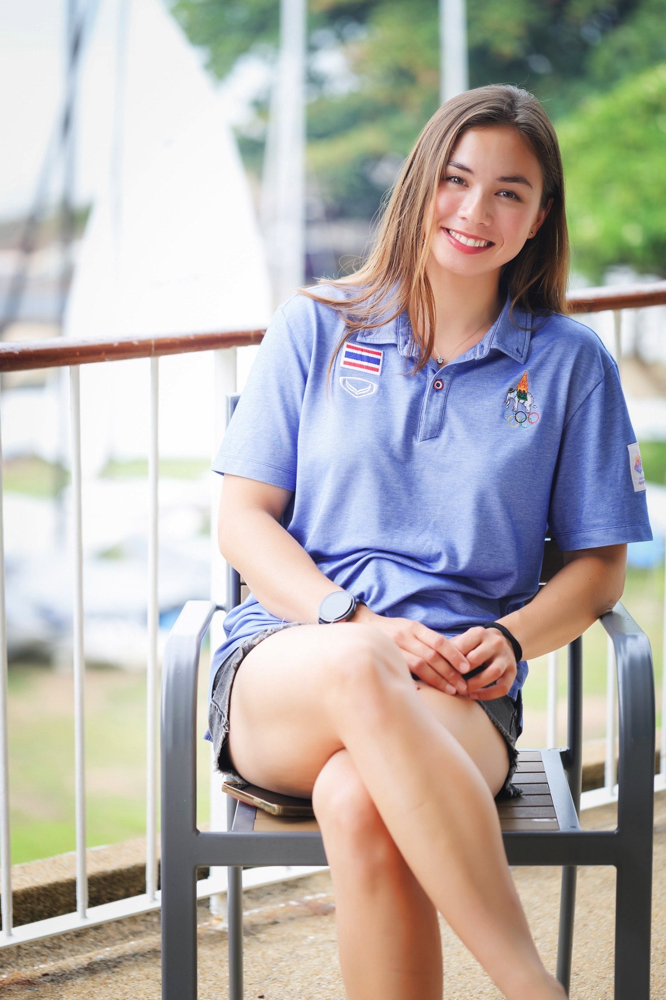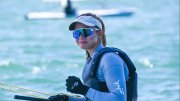When Sophia Montgomery first sailed, she hated it. Then eight years old, she disliked the waves and felt seasick. She kept getting hit by the boom—the long metal pole at the bottom of the sail. And she didn’t even know how to turn her boat around, so she kept streaking out into the ocean until her dad hopped onto her boat, nearly tipping it in his rescue attempt. But now, Montgomery ’26 is an Olympic sailor, set to represent Thailand in Paris.
Nearly every weekend when she was growing up, Montgomery and her family would drive two hours from Bangkok to the coastal city of Pattaya (which she calls “a very wild touristic place” better known for its illicit activities than its sailing). She and her sister, five years younger, would practice their skills while their father, an American who sailed at the University of California Los Angeles, watched from the shore. As she improved, she grew to love the sport, in all its complexity. In a race, a sailor must both go fast and out-position opponents. “But the added element is that you’re sailing against nature,” she says. “You have to read the winds, you have to read the currents.”
During the week, without ocean access, Montgomery practiced taekwondo. Though throwing punches and pulling ropes may not seem similar, she says that her martial arts practice has improved her sailing. Her coach disliked formal taekwondo, which focuses on earning points, and instead taught “MMA-style” fighting. In 2019, for her black belt test, Montgomery endured a 30-minute battle royale, fighting a series of boys for a half hour. Emerging victorious, with tousled braids and a black eye to show for it, she proved she could “stand my ground and just keep fighting.” In sailing, “The races are six days long…it’s quite taxing,” she says. “Your body is completely in pain…and you have to keep going.”

Though she sailed competitively in high school, she did not go through the collegiate recruiting process because she sailed a type of boat different from those used in U.S. competition (she sails an ILCA 6 or a Laser Radial). Even as a walk-on, she quickly thrived on the Harvard sailing team, winning the Inter-Collegiate Sailing Association Women’s Singlehanded National Championship as a sophomore.
Following that season, Montgomery took a gap year to vie for an Olympic bid. Sailors must earn an “Olympic ticket” for their country by placing well at certain international competitions. She earned her slot at the Asian Championships in December, hosted at her home club in Pattaya, where she got to race alongside her younger sister.
Initially, she had planned to return to Cambridge this past January for the spring semester, but clinching the ticket meant that Thailand’s sailing federation would fund her travel and coaching for international competitions preceding the Olympics. Rather than studying for midterms, Montgomery spent the semester competing on the Greek, Spanish, and French coastlines. With an individual coach and consistent practice, she says she could feel herself “improving at a much faster rate.” But she says her sailing is still a work in progress. She and her coach are not sure what combination of rest and training will help her achieve peak performance at the Olympics. “We’re trying things here and there,” she says. “It’s all really fun.”
When not on the open water, her mind drifts back to Cambridge. After the summer, she’ll return to campus, where she is concentrating in physics and may pursue a mind, brain, and behavior secondary. She looks forward to living with her first-year roommates again (“The group chat is going off,” she says, appreciating the chance to stay in touch)—and even to studying. “It feels like I’m a freshman again,” she says. But before Montgomery calculates fluid dynamics on a Science Center whiteboard this fall, she will judge the wind and waves while the world watches.
Interested in other Harvard Olympians? Read about eight affiliates who compete in fencing here.









